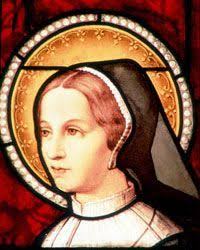HOMILY WEEK 18 06 – Year I
Our Mustard Seed Faith:
Optional Memorial of St. Jane Frances de Chantal
(Dt 6:4-13; Ps 18:2-51; Mt 17:14-20)
****************************************
On a pilgrimage to the Holy Land, I noticed a Jewish man wrap a coil of leather around his arm and proceed to pray in a corner of the airport, as his wife and children waited. Then at the Western Wall at the beginning of the Sabbath, our group watched as an orthodox Jew helped an American tourist wrap a leather strap around his arm and lifted his baseball cap to place a leather strap attached to a small square amulet around his head.
The first reading today explains those actions – they are simply carrying out what Moses commanded the Israelites to do with the Great Schema of Israel: “Bind these words as a sign on your hand and fix them as an emblem on your forehead.”
The Gospel moves us into a new paradigm – faith in Jesus and the Trinity that Jesus reveals, and growth in our personal relationship with our Trinitarian God.
In that first reading, Moses gives the people the Great Schema after his encounter with God on Mt Sinai, an Old Testament theophany. He warns them not to forget what God has done for them. They must love God alone and have no idolatry
In the Gospel, we are taken to another the mountain, the mountain of the transfiguration where we experienced a New Testament theophany and paradigm shift. There, we see that two great Old Testament figures, Moses the great law giver and Elijah the great prophet, appeared to Jesus in the presence of the three great New Testament figures, Peter the first pope, James the leader of the Jerusalem community, and John our last link to the apostolic era. These five witnesses testify to this transition from the Old Testament image of God, to the New Testament image of God as a Trinitarian relationship. The Father’s voice spoke from the heavens and blessed Jesus while the Spirit was represented by the cloud and bright clothes.
Two recent books, The Shack by Paul William Johnson and Divine Dance by Richard Rohr, are timely works on this new paradigm. The Shack describes God as a Trinitarian relationship; Rohr describes God as a divine dance or perichoresis, an ancient Greek word for God.
Our faith now is to be in God as Father, Son and Spirit, family, intimate relationship, even a divine dance. The amazing art work by André Rublev entitled the Hospitality of Abraham or The Trinity depicts three angelic figures representing the Father, Son and Holy Spirit in a delicate, loving, intimate relationship around an altar that has on its front side a blank space for a mirror – inviting us to see ourselves as part of that relationship and to join in the divine dance.
Once they are down from the mountain, Jesus is confronted with a boy in need of physical healing, and so Jesus adds the dimension of healing to our faith in him as he heals the boy that the disciples were unable to heal due to their lack of faith.
Jesus is very patient. He knows that our faith is like a mustard seed that takes time to grow, develop and mature. We can make our own the prayer of the official in the gospel who prayed, “Lord, I believe; help my unbelief.”
Little by little, our faith provides us with hope, and that hope enables us to love. Little by little, our belief in Jesus and our Trinitarian God must grow into a more personal faith, that in turn must grow into a deeper and deeper trust, that in turn should lead us to a daily surrendering of our will to the will of God.
A prayer that we could pray each day as a way to foster our growth in faith could be the Serenity prayer: “God, grant me the Serenity to accept the things that I cannot change, the courage to change the things I can, and the wisdom to know the difference.”

St. Jane Frances de Chantal
Today, we honour St. Jane Frances de Chantal, who was born at Dijon, France, in 1572. She and her husband had six children; in 1601 her husband died in an accident. After overcoming her depression, Jane Frances sought the spiritual dimension of her suffering. With her spiritual advisor, Francis de Sales, she founded the Congregation of the Visitation for women who wished to live religious life but could not endure the austerity of the existing religious orders. Committed to working with the sick and the poor, she died in 1641, having established about 85 monasteries.
The Eucharist is a tremendous act of faith. We listen to the Word of God, and believe that humble gifts of bread and wine are transformed by the power of the Holy Spirit that raised Jesus from the dead into the very Body and Blood of Christ.
We who receive communion are in turn transformed into the Body of Christ, sent out to proclaim the Good News of our Trinitarian God, to grow in faith, hope and love ourselves, and to invite others to join in the divine dance with our God.



